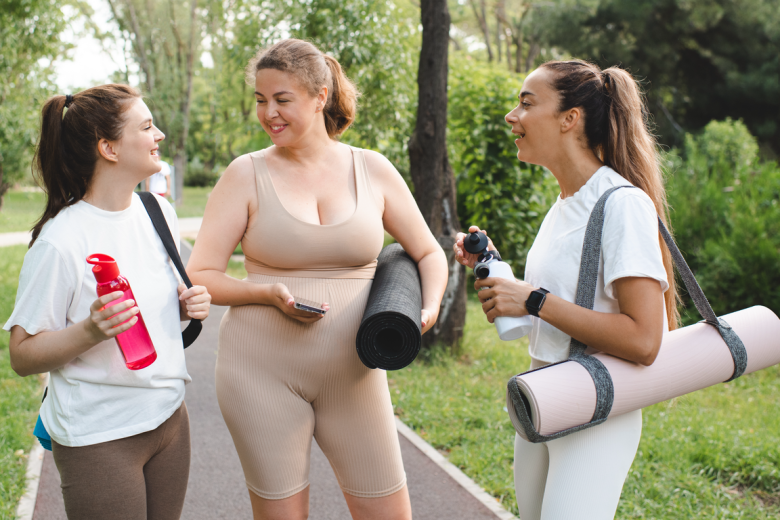Stress Less, Sleep More to Help Prevent Diabetes



Stress and poor sleep are just 2 factors that increase your risk for prediabetes and diabetes. While you can’t control certain circumstances like a family history of diabetes, you can take other actions to prevent or reverse prediabetes.
You’re probably familiar with common risk factors for Type 2 diabetes, such as excess weight, inactivity, and a family history of the disease.[1] But did you know that stress and poor sleep also play a role?[2]
That’s why it’s important to find healthy ways to stress less and sleep better if you have prediabetes.[3] Without taking action now, you have a 50% chance of developing Type 2 diabetes within 5-10 years.[4]
Fortunately, you can take steps to help prevent diabetes, starting with catching more z’s and finding healthy ways to cope with stress.[5]
About stress, sleep, and diabetes
Sleep and stress often play off each other. If you’re stressed, you’re probably not sleeping well.[6] And if you’re not sleeping well, you’re probably stressed about it.[7] Let’s take a deeper look at how poor sleep and stress increase diabetes risk:
Does sleep affect diabetes risk?
The Centers for Disease Control and Prevention (CDC) estimates that 1 in 3 Americans don’t get the recommended 7 to 9 hours of sleep each night.[8] One study found that people who don’t get enough sleep are almost 40% more likely to develop diabetes than their more-rested counterparts.[9]
The amount of slumber isn’t the only issue. Studies show that waking at night, getting too much sleep, and routinely going to bed and waking up at different times (irregular sleep) are also bad for you.[10] Sleep’s impact on diabetes risk is on par with having a family history of the disease.[11] And if you already have prediabetes or diabetes, poor sleep can worsen the condition.[12]
Several factors may be at play:
- Increased obesity risk:[13] Ongoing sleep loss causes your body to release more leptin and ghrelin. These so-called hunger hormones keep your appetite in check. Having too much of these hormones in your system can make you feel hungry. You may overeat and gain weight, which contributes to diabetes risk. Poor sleep can also affect how well your cells change foods and drinks into energy (your metabolism).
- Decreased insulin sensitivity: Even young, healthy people with no diabetes risk factors don’t use and respond to insulin as they should when they’re sleep deprived.[14] This condition is known as insulin resistance or impaired insulin sensitivity.[15] As little as 4 to 5 days of poor sleep can lead to a 25% to 30% drop in insulin sensitivity. [16]
How does stress affect diabetes risk?
Emotional stressors, such as family or work-related concerns, as well as physical stressors brought on by illness or injury, can raise blood glucose.[17] Unmanaged, chronic stress can affect your body’s ability to keep blood glucose levels in the healthy range, putting you at risk for diabetes.[18]
Stress triggers both emotional and physical responses.[19] One study found that sudden or ongoing stress doubles the risk of Type 2 diabetes.[20] Although the study focused on women 65 and older, stress affects men similarly.[21] It puts your body into fight-or-flight mode, flooding your body with adrenaline, cortisol, and other hormones.[22]
These hormones:[23]
- Tell your liver to release extra glucose into the bloodstream to give you more energy to deal with the stressful event
- Cause your pancreas to make less insulin, a hormone that helps move glucose from the bloodstream into cells in muscles and tissues
- Affect how cells respond to insulin and take up glucose from the blood (insulin sensitivity)
- Raise blood glucose levels
3 ways to stress less, sleep better, and help prevent diabetes
The same actions that reduce stress levels can also help you sleep better. Try these 3 steps to stress less and sleep more:
- Fuel your body the right way: Your dietary choices affect your diabetes risk and how you feel emotionally and physically.[24] Large meals or snacks, as well as caffeine and alcohol, can make you feel anxious and impair sleep.[25]
- Get a move on: Exercise relieves stress and helps you sleep more soundly.[26] Plus, research shows that moving more lowers diabetes risk.[27]
- Unwind: Deep breathing, mindfulness, and meditation exercises can help you relax and prepare your body for a good night’s rest.[28]
Don’t stress: Act now to lower diabetes risk
Stress and poor sleep are just 2 factors that increase your risk for prediabetes and diabetes. While you can’t control certain circumstances like a family history of diabetes, you can take other actions to prevent or reverse prediabetes. Plus, you’ll likely feel better physically and mentally when you’re less stressed and well rested.
If you’re at risk for diabetes, you may be curious about how to make smarter shopping choices to protect your health. The Sincerely Health nutrition tools in the app can help.
You can start by downloading the app. You’ll save $10 on groceries* for creating an account. Next, create a personalized Sincerely Health nutrition profile to receive 1,000 points*.
Your nutrition profile allows you to:
- Set specific nutrition goals.
- Earn 10 points for each item you purchase for a maximum 100 points per order (that’s 10 items at 10 points each).
FAQs
How does sleep affect diabetes?
Lack of sleep, or poor quality of sleep, increases your risk for diabetes. It also can worsen prediabetes or diabetes.
How does stress affect diabetes?
Stress can raise blood glucose levels, increasing your risk for diabetes. Unmanaged high blood glucose in people with diabetes can potentially damage the heart, kidneys, and other organs.[29]
Sign up for Sincerely Health and create a nutrition profile to help prevent prediabetes and diabetes today!
Download your app on the App Store today












[1] Centers for Disease Control and Prevention (CDC). Diabetes Risk Factors. Last reviewed May 15, 2024. https://www.cdc.gov/diabetes/risk-factors/index.html
[2] Harvard T.H. Chan School of Public Health. Sleep. https://nutritionsource.hsph.harvard.edu/sleep/; Cleveland Clinic. How Stress and Depression Affect Diabetes. Last reviewed March 8, 2024. https://health.clevelandclinic.org/stress-and-diabetes
[3] National Institute of Diabetes and Digestive and Kidney Diseases. Insulin Resistance and Prediabetes. Last reviewed May 2018. https://www.niddk.nih.gov/health-information/diabetes/overview/what-is-diabetes/prediabetes-insulin-resistance
[4] Cleveland Clinic. Blood Glucose (Sugar) Test. Last reviewed November 16, 2022. https://my.clevelandclinic.org/health/diagnostics/12363-blood-glucose-test
[5] Cleveland Clinic. Blood Glucose (Sugar) Test. Last reviewed November 16, 2022. https://my.clevelandclinic.org/health/diagnostics/12363-blood-glucose-test
[6] American Psychological Association. Stress and Sleep. Last reviewed 2013. https://www.apa.org/news/press/releases/stress/2013/sleep#; Cleveland Clinic. Stress. Last reviewed May 15, 2024. https://my.clevelandclinic.org/health/diseases/11874-stress
[7] American Psychological Association. Stress and Sleep. Last reviewed 2013. https://www.apa.org/news/press/releases/stress/2013/sleep#; Cleveland Clinic. Stress. Last reviewed May 15, 2024. https://my.clevelandclinic.org/health/diseases/11874-stress
[8] Centers for Disease Control and Prevention (CDC). About Sleep. Last reviewed May 15, 2024. https://www.cdc.gov/sleep/about/index.html; Centers for Disease Control and Prevention (CDC). FastStats: Sleep and Adults. Last reviewed May 15, 2024. https://www.cdc.gov/sleep/data-research/facts-stats/adults-sleep-facts-and-stats.html
[9] National Institute of Diabetes and Digestive and Kidney Diseases. The Impact of Poor Sleep on Type 2 Diabetes. Last reviewed March 17, 2021. https://www.niddk.nih.gov/health-information/professionals/diabetes-discoveries-practice/the-impact-of-poor-sleep-on-type-2-diabetes
[10] National Institute of Diabetes and Digestive and Kidney Diseases. The Impact of Poor Sleep on Type 2 Diabetes. Last reviewed March 17, 2021. https://www.niddk.nih.gov/health-information/professionals/diabetes-discoveries-practice/the-impact-of-poor-sleep-on-type-2-diabetes
[11] National Institute of Diabetes and Digestive and Kidney Diseases. The Impact of Poor Sleep on Type 2 Diabetes. Last reviewed March 17, 2021. https://www.niddk.nih.gov/health-information/professionals/diabetes-discoveries-practice/the-impact-of-poor-sleep-on-type-2-diabetes
[12] National Institute of Diabetes and Digestive and Kidney Diseases. The Impact of Poor Sleep on Type 2 Diabetes. Last reviewed March 17, 2021. https://www.niddk.nih.gov/health-information/professionals/diabetes-discoveries-practice/the-impact-of-poor-sleep-on-type-2-diabetes
[13] Harvard T.H. Chan School of Public Health. Sleep. https://nutritionsource.hsph.harvard.edu/sleep/; Sleep Foundation. Obesity and Sleep. Last reviewed December 22, 2023. https://www.sleepfoundation.org/physical-health/obesity-and-sleep
[14] National Institute of Diabetes and Digestive and Kidney Diseases. The Impact of Poor Sleep on Type 2 Diabetes. Last reviewed March 17, 2021. https://www.niddk.nih.gov/health-information/professionals/diabetes-discoveries-practice/the-impact-of-poor-sleep-on-type-2-diabetes
[15] National Institute of Diabetes and Digestive and Kidney Diseases. Insulin Resistance and Prediabetes. Last reviewed May 2018. https://www.niddk.nih.gov/health-information/diabetes/overview/what-is-diabetes/prediabetes-insulin-resistance; Cleveland Clinic. Insulin Resistance. Last reviewed December 16, 2021. https://my.clevelandclinic.org/health/diseases/22206-insulin-resistance
[16] National Institute of Diabetes and Digestive and Kidney Diseases. The Impact of Poor Sleep on Type 2 Diabetes. Last reviewed March 17, 2021. https://www.niddk.nih.gov/health-information/professionals/diabetes-discoveries-practice/the-impact-of-poor-sleep-on-type-2-diabetes
[17] Intermountain Health. Stress Is Affecting Your Type 2 Diabetes. Last reviewed August 4, 2020. https://intermountainhealthcare.org/blogs/stress-is-affecting-your-type-2-diabetes
[18] Cleveland Clinic. How Stress and Depression Affect Diabetes. Last reviewed March 8, 2024. https://health.clevelandclinic.org/stress-and-diabetes
[19] Cleveland Clinic. Stress. Last reviewed May 15, 2024. https://my.clevelandclinic.org/health/diseases/11874-stress
[20] American Heart Association. Stress May Increase Type 2 Diabetes Risk in Women. Last reviewed November 6, 2018. https://www.heart.org/en/news/2018/11/06/stress-may-increase-type-2-diabetes-risk-in-women
[21] Intermountain Health. Stress Is Affecting Your Type 2 Diabetes. Last reviewed August 4, 2020. https://intermountainhealthcare.org/blogs/stress-is-affecting-your-type-2-diabetes
[22] Cleveland Clinic. How Stress and Depression Affect Diabetes. Last reviewed March 8, 2024. https://health.clevelandclinic.org/stress-and-diabetes
[23] Cleveland Clinic. Stress. Last reviewed May 15, 2024. https://my.clevelandclinic.org/health/diseases/11874-stress; Cleveland Clinic. How Stress and Depression Affect Diabetes. Last reviewed March 8, 2024. https://health.clevelandclinic.org/stress-and-diabetes; University of California, San Francisco. Blood Sugar and Stress. https://dtc.ucsf.edu/types-of-diabetes/type2/understanding-type-2-diabetes/how-the-body-processes-sugar/blood-sugar-stress/
[24] Harvard T.H. Chan School of Public Health. Sleep. https://nutritionsource.hsph.harvard.edu/sleep/; Harvard Health Publishing. 8 Secrets to a Good Night’s Sleep. Last reviewed November 20, 2023. https://www.health.harvard.edu/newsletter_article/8-secrets-to-a-good-nights-sleep; Intermountain Health. Stress Is Affecting Your Type 2 Diabetes. Last reviewed August 4, 2020. https://intermountainhealthcare.org/blogs/stress-is-affecting-your-type-2-diabetes
[25] Harvard T.H. Chan School of Public Health. Sleep. https://nutritionsource.hsph.harvard.edu/sleep/; Harvard Health Publishing. 8 Secrets to a Good Night’s Sleep. Last reviewed November 20, 2023. https://www.health.harvard.edu/newsletter_article/8-secrets-to-a-good-nights-sleep; Intermountain Health. Stress Is Affecting Your Type 2 Diabetes. Last reviewed August 4, 2020. https://intermountainhealthcare.org/blogs/stress-is-affecting-your-type-2-diabetes
[26] Harvard T.H. Chan School of Public Health. Sleep. https://nutritionsource.hsph.harvard.edu/sleep/; Intermountain Health. Stress Is Affecting Your Type 2 Diabetes. Last reviewed August 4, 2020. https://intermountainhealthcare.org/blogs/stress-is-affecting-your-type-2-diabetes
[27] Centers for Disease Control and Prevention (CDC). Adult Activity: An Overview. Last reviewed December 20, 2023. https://www.cdc.gov/physical-activity-basics/guidelines/adults.html; National Library of Medicine (Endotext). The Role of Exercise in Diabetes. Last reviewed January 6, 2023. https://www.ncbi.nlm.nih.gov/books/NBK549946/
[28] Harvard Health Publishing. 8 Secrets to a Good Night’s Sleep. Last reviewed November 20, 2023. https://www.health.harvard.edu/newsletter_article/8-secrets-to-a-good-nights-sleep; Sleep Foundation. 20 Tips for How to Sleep Better. Last reviewed December 8, 2023. https://www.sleepfoundation.org/physical-health/obesity-and-sleep
[29] Cleveland Clinic. Hyperglycemia (High Blood Sugar). Last reviewed March 2, 2023. https://my.clevelandclinic.org/health/diseases/9815-hyperglycemia-high-blood-sugar

















